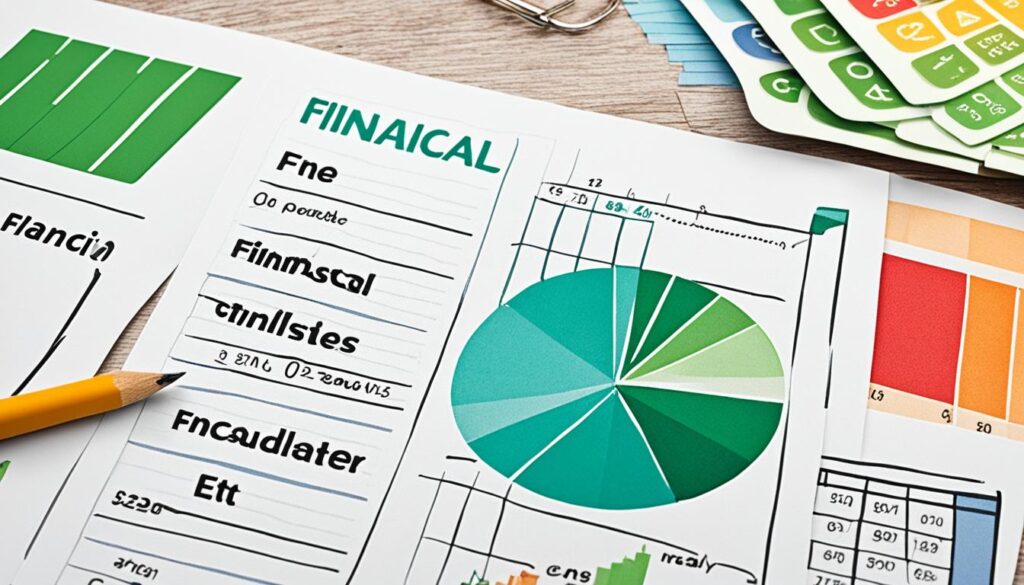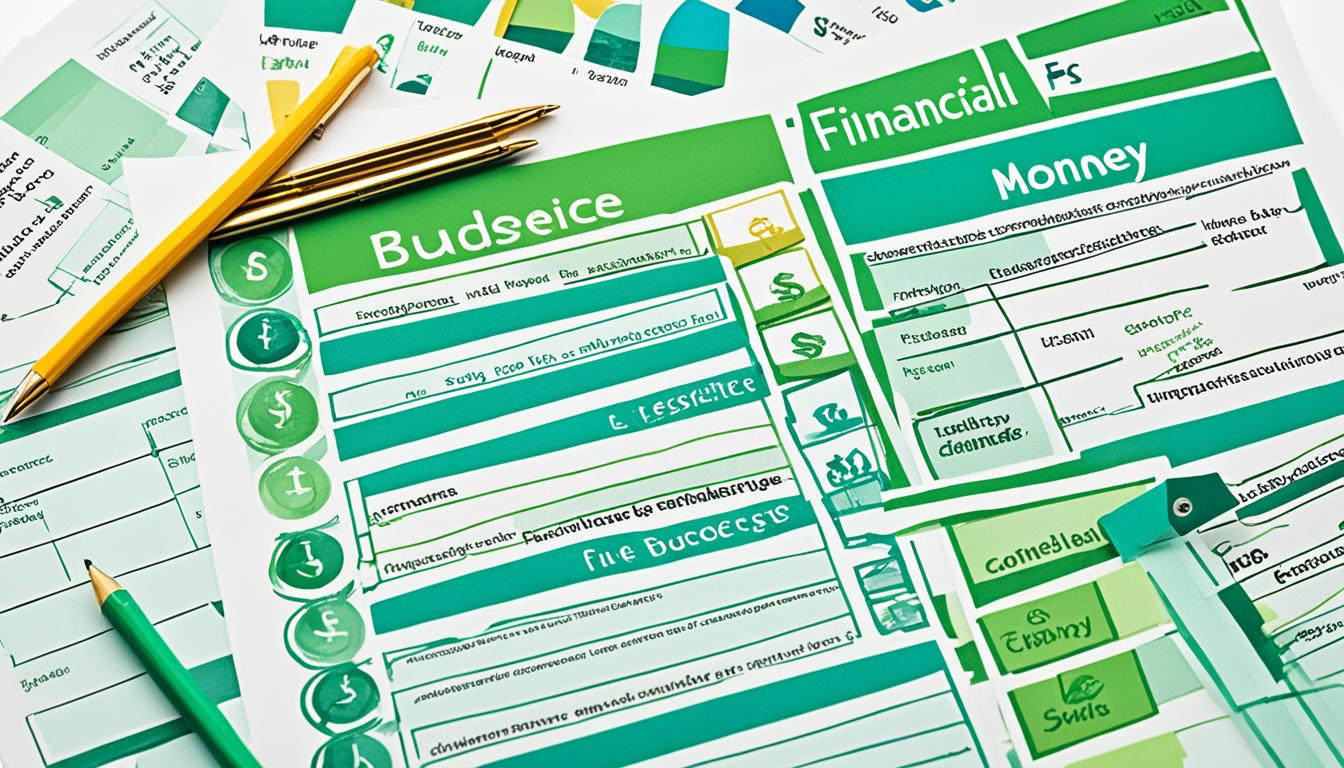Financial literacy is key for managing money well and making smart financial choices. It covers skills like keeping a budget and knowing how to invest. With these, people can control their money and aim for financial safety.
Understanding important money principles is part of financial literacy. This includes topics like how interest works, handling debt, and planning your finances. Having a strong financial base helps people make wise choices that meet their goals.
Learning to manage money is critical. It means making a budget, keeping an eye on how much you spend, and setting money goals. This helps use your money wisely and stay out of debt.
Knowing the different ways you can store and grow your money is also important. This can involve using banks and looking into investments. It’s about choosing the best ways to save and grow your money over time.
Overall, knowing how to handle your money is crucial for a stable financial future. With good financial literacy, people can steer their money toward their dreams.
The Importance of Financial Literacy
Understanding money matters is key to a stable future. Research from FINRA shows that knowing about finances helps in many ways. For example, people can handle bills better, save money, build safety nets, and start setting funds aside for retirement.
Learning about finance can change lives. It teaches ways to stay out of debt, spend wisely, and have money coming in during old age. These skills are vital for making smart financial choices.
Knowing about money lets us deal with tricky cash situations. This includes picking the right loans, figuring out where to invest, and setting future money aims. With this know-how, people are ready for whatever money life throws at them.
Enhancing Decision-Making
Good decisions come from knowing the facts. When people get financially smart, they can budget better, save for big goals, and choose the right investments. This knowledge lets them plan for a secure financial future.
With money smarts, people avoid shady deals and too much debt. They can spot and skip harmful money traps. This makes them more confident in facing the complex world of finance.
The Role of Education
Teaching about money early is important. By learning in schools, colleges, and community spots, everyone can acquire these basic financial skills. This early lesson helps in seeing the worth of money and making smart choices forever.
There are many efforts to teach about money. This includes programs by banks, charities, and government groups. Their aim is to give people resources to get better at handling money and live financially healthier.
| Benefits of Financial Literacy | Percentage of Individuals |
|---|---|
| Make ends meet | 75% |
| Spend less of their income | 81% |
| Create an emergency fund | 68% |
| Open a retirement account | 62% |
What Is Financial Literacy?
Financial literacy is key to managing money well. It involves skills and knowledge to make wise financial choices. Let’s look at its important parts.
The Importance of Financial Skills
Financial skills are vital for handling personal finances. They cover everything from making a budget to investing wisely. This knowledge helps people take charge of their money.
Personal Financial Management
Managing personal finances is essential. It means knowing your income, expenses, and how money flows in and out. Strategies like budgeting and keeping track of spending can help you make the most of your money.
Budgeting
Creating a budget is crucial for financial health. It’s a plan for your income, spending, and saving. A budget helps you spend smarter, save for the future, and avoid debt.
Investing
Investing is important for long-term financial growth. It means using your money to earn more money over time. Learning about stocks, bonds, and mutual funds can help you make smart investment choices.
To sum up, financial literacy includes skills like managing money, budgeting, and investing. It helps people make smart financial decisions, avoid money troubles, and work towards a stable financial future.

Personal Finance Basics
Personal finance is how we manage our money wisely. We handle things like saving, budgeting, and paying off debts. It also includes using credit wisely and making smart investments. Learning about these topics will help us reach our financial dreams.
Banking
Banking is essential for our financial life. It gives us ways to save and use our money. Services usually include:
- Opening a savings account to save money for short-term and long-term goals.
- Having a checking account for daily money needs, like paying bills.
- Learning to use online and mobile banking for easy money management.
Budgeting
Budgeting helps us plan our spending and savings. We figure out how to use our money wisely. This way, we can meet our needs and still save. Budgeting involves:
- Tracking where our money goes by noting our spending and earnings.
- Setting goals and placing our money where it’s needed the most.
- Making a budget that covers spending, saving, and paying off debt.
Debt and Credit Management
Managing debt and credit is important for our financial health. This means using credit wisely. It also means being careful with loans. Debt and credit management means:
- Knowing about different kinds of debt, like credit cards.
- Paying off debt on time and not borrowing too much.
- Being responsible with credit to keep a good credit score.
Investing
Investing is key for growing our wealth. It allows us to earn more from our money. For investing, we should:
- Know about investment options like stocks and mutual funds.
- Think about risk and what we want from investing.
- Keep an eye on our investments and adjust them when necessary.
Understanding personal finance helps us take charge of our money. Whether we’re looking to cut costs, pay off debt, or retire comfortably, knowing these basics is crucial. Here’s a summary of what we need to know:
| Key Components of Personal Finance | Description |
|---|---|
| Banking | Accessible financial services for managing money, including savings and checking accounts. |
| Budgeting | Creating a financial plan to track income, expenses, savings, and debt repayment. |
| Debt and Credit Management | Managing debt responsibly and maintaining a solid credit history. |
| Investing | Using financial instruments to grow wealth over time. |
Looking into these financial areas gives us a good start. With this knowledge, we can work towards our future financial goals.
Introduction to Bank Accounts
A bank account is a key financial tool we use to manage money. It stores our funds safely, making it easier to save. We can use it for many things like buying items with cards, writing checks, and getting our pay. Learning about bank accounts is very important for everyone’s financial know-how.
Now, let’s look at the different kinds of bank accounts, each with its own purpose.
Savings Accounts
A savings account helps people save their money and earn a little interest. It’s good for saving up for emergencies or short-term goals. You can easily add to or take money out of these accounts.
Checking Accounts
Checking accounts are for everyday money needs. They let us put money in, pay bills, or buy things easily. They include a debit card and the option to write checks.
High-Yield Savings Accounts
High-yield savings accounts pay more interest but might need a larger first deposit or balance. They still let you get your money out when you need it. These can be great if you want to earn more from your savings.
It’s important to know what makes each type of bank account different. This knowledge helps manage money better, whether for saving up or handling our daily expenses.
Let me show you a table with the main points about savings, checking, and high-yield savings accounts:
| Bank Account Type | Key Features |
|---|---|
| Savings Account |
|
| Checking Account |
|
| High-Yield Savings Account |
|

What’s An Emergency Fund?
An emergency fund is key in knowing how to handle money well. It offers a buffer for tough times like losing a job or needing to fix a car. With money put aside for these situations, the pressure decreases.
It’s not just about where you keep the money, but that you have it when needed. Saving it in a typical bank account works for some. Others prefer high-interest accounts or safe investments like CDs.
Having money for surprises is a big part of staying financially strong. It stops you from maxing out credit cards to cover urgent costs.
Learning about finances shows why an emergency fund matters for all. It lets you take charge of your money wisely. This means you’re ready for the unexpected.
An emergency fund is a symbol of financial safety. It brings comfort, knowing you’re ready for sudden money needs.
So, everyone should make an emergency fund a priority. Constantly adding to it will safe-guard you and your loved ones against financial hits.
Why Is an Emergency Fund Important?
An emergency fund matters for several reasons:
- Financial Stability: It keeps your finances steady during hard times. You can cover essential costs without piling up debt.
- Peace of Mind: Knowing you have a backup plan eases stress. You can face the unknown more calmly.
- Flexibility: It lets you deal with urgent needs without veering off your long-term money plans.
- Reduced Reliance on Credit: Avoiding debt is easier if you already have some funds set aside. This keeps your financial health strong.
Building an Emergency Fund
To start an emergency fund, save regularly and spend wisely. Here’s how:
- Set a Savings Goal: Aim for three to six months’ living expenses. This is a good financial safety net.
- Create a Budget: Decide where you can cut expenses to save more. Makes sure your saving plan fits your income.
- Automate Savings: Have money automatically go from checking to your emergency fund. It keeps saving steady and spare you from spending temptations.
- Avoid Touching the Fund: Use it only for true emergencies. This keeps your fund ready when really needed.
- Replenish the Fund: If you use it, fill it back up ASAP. This way, it’s there for the next unexpected event.
These steps will strengthen your emergency fund. They also make your financial ground firmer for the future.
| Benefits of an Emergency Fund | Steps to Build an Emergency Fund |
|---|---|
| Financial Stability | Set a Savings Goal |
| Peace of Mind | Create a Budget |
| Flexibility | Automate Savings |
| Reduced Reliance on Credit | Avoid Touching the Fund |
Introduction to Credit Cards
Credit cards are crucial in today’s money world. They offer lots of ease and flexibility. People can buy things or get money when they need it. It’s vital to know how to use credit cards right. This helps in making smart money choices. And it’s key to handling debt wisely.
Unlike debit cards, credit cards don’t immediately take money from your bank. They let you borrow money, but up to a certain amount. Always keep in mind, using a credit card means you’re taking a loan you must pay back.
The cost of using credit cards is important to understand. Credit card companies add interest to your unpaid balances each month. Knowing your card’s interest rates and how to pay back can avoid extra debt.
Responsible Credit Card Use
Using credit cards right is very beneficial. It can help boost your credit score. Good payment habits and using credit wisely make you look good to lenders and employers.
Credit cards also provide flexibility. They allow you to buy things without cash, giving a short loan. They also offer extras like rewards and protection for what you buy.
But, be careful with credit cards. It’s easy to buy too much. Setting a budget and knowing your spending limits can stop you from overspending. Also, paying on time and keeping low card balances are vital for good credit health.
Repaying Debt
Paying off what you owe on credit cards is crucial. Always pay the minimum to avoid extra fees. But, paying the full amount is better to keep from paying more in interest.
Have a plan to pay your credit card debt. Focus on the debts with the highest interest first. Using methods like the avalanche or snowball can help. Also, look into debt consolidation to make payments simpler and possibly reduce costs.
Good credit card practices are critical for your financial health. Learn about credit cards, use them wisely, and pay off debt smartly. This way, you can benefit from credit cards without getting into too much debt.
The 5 Components of Financial Literacy
Financial literacy helps people make smart money choices. It has five main parts that are key for handling money well. We’ll look into each one.
Budgeting
Budgeting is the start of managing your money. It’s about planning how to use your income for expenses, saving, and investing. A budget lets you watch your spending, focus on your goals, and make sure you don’t overspend. It gives you power over your finances and helps you spend wisely.
Building and Improving Credit
Credit is how well you can use borrowed money and pay it back. Good credit can help you with loans, getting a place to live, or better insurance. To keep your credit healthy, learn what affects your credit score, use credit the right way, and pay what you owe on time.
Saving
Saving is crucial for financial health. It means putting money aside for both current and future needs. It lets you build a safety net, buy big items without loans, and plan for what’s ahead. Saving regularly sets you up for achieving your dreams.
Borrowing and Repaying Debt
Debt can be helpful or hard, depending on how it’s handled. It’s vital to know about different debts and how to borrow wisely. Also, having a clear plan to pay off debts keeps you from high interest and stress. Effective debt management keeps your finances stable.
Investing
Investing is about increasing your wealth over time. It means putting money in things like stocks or real estate to make a profit. Investing is key for big financial goals like retiring comfortably or funding education. Knowing your investment choices, managing risks, and having a varied portfolio is essential.
By learning these five financial areas, people can make better money choices. This leads to more stable finances and closer to reaching their goals. Let’s keep learning about financial literacy to shape our financial futures.
Conclusion
Financial literacy is a must-have skill. It helps you handle your money wisely, make smart choices, and reach your goals. When you get a grip on things like budgeting, handling credit, saving, paying off debts, and investing, your financial situation gets better. You become more stable financially.
Are you at the start of your financial path? Or maybe you want to know more to better your understanding? It’s always a good time to learn more about money. Taking charge of your financial future is key. By learning these skills, you’ll feel ready to face tough money matters. This can set you up for a strong financial future and help you meet your dreams.
Don’t forget, financial literacy means more than just managing your money. It’s about ensuring a better tomorrow for you and those you care about. So, take on the challenge of financial literacy. It leads to financial freedom and success. Start now to make your future brighter and full of possibilities.
FAQ
What is financial literacy?
Financial literacy means people can understand and use financial skills. This includes managing personal money, budgeting, and investing. You need to grasp concepts like compound interest, debt management, and making a financial plan.
Why is financial literacy important?
It’s vital because it helps us make smart money choices. With good financial skills, we can achieve security and avoid financial troubles. Those who are financially savvy tend to save more, spend wisely, and prepare for the future with things like retirement savings.
What are the basics of financial literacy?
The basics include managing your own money, budgeting, investing, and understanding how interest works. It’s also about knowing how to handle debt and plan for your financial future. These skills are key to using your money wisely and being financially secure.
What is personal finance?
Personal finance is how we put financial literacy into action for ourselves. It covers topics like handling money in banks, budgeting, managing debt, and investing. Knowing these things helps us meet our financial goals and live without money worries.
What is a bank account?
It’s typically the first financial account we open. It’s a safe place for our money, which we can use for big life buys or plans. We need bank accounts for things like paying with cards, writing checks, and getting paid.
What is an emergency fund?
An emergency fund is money set aside for tough times, like when you lose your job or have a health expense. It’s crucial for keeping your finances strong without resorting to loans or credit cards.
What are credit cards?
Credit cards let you borrow money to pay off later. It’s important to know how they work, like interest rates and payback rules. When used wisely, they can improve your credit score and offer financial flexibility.
What are the components of financial literacy?
Financial literacy involves budgeting, credit building, saving, debt handling, and investing. Each part is important for managing money well and meeting your financial dreams.


















